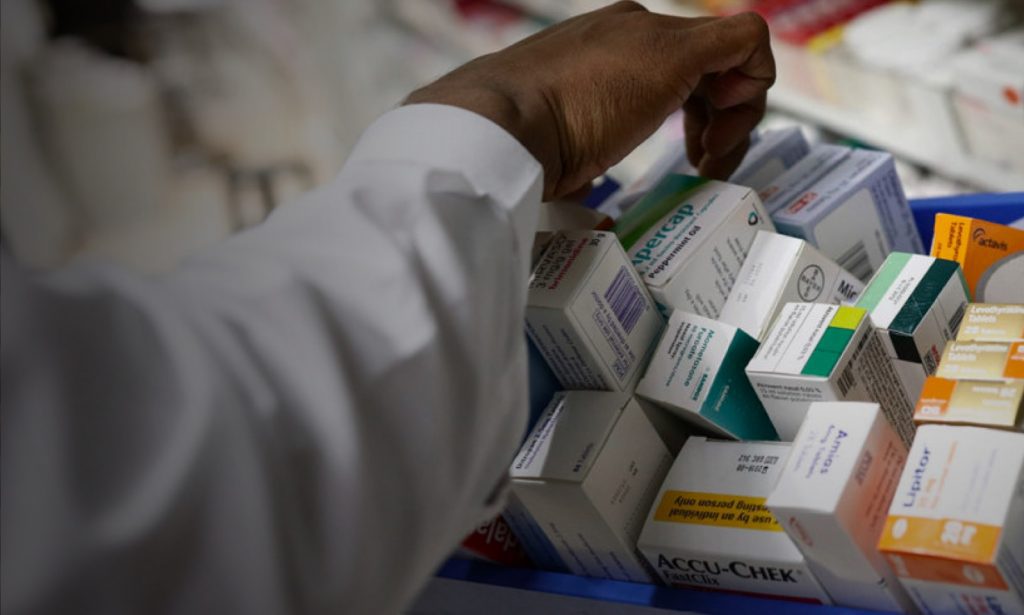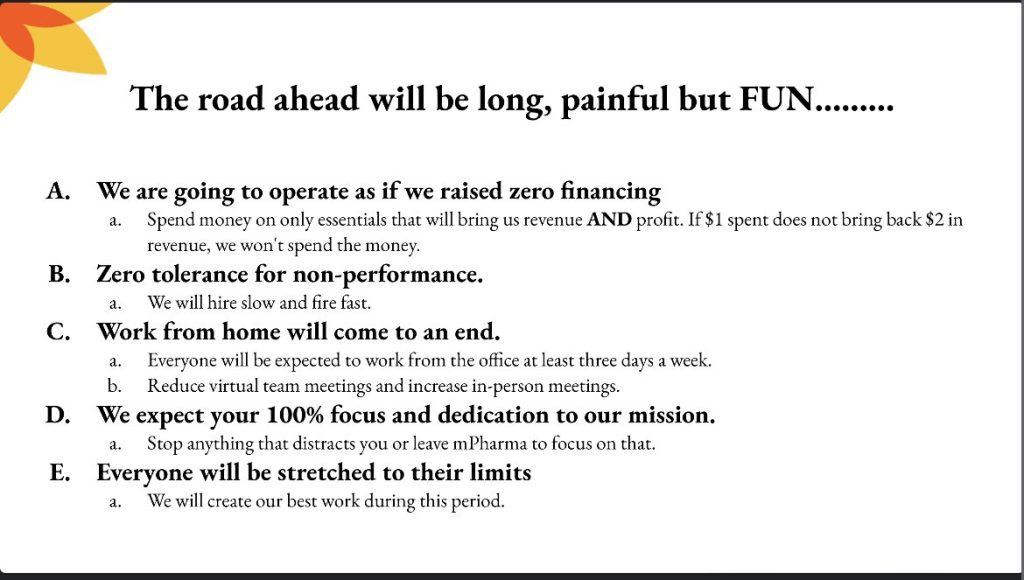After Layoffs, Planned Stringent Reforms At mPharma Spark Controversy

Signals and visuals that emerged following what appears to be a company-wide in-person meeting at mPharma on Tuesday, have been met with concern and criticism over a perceived potentially harmful approach to leadership being adopted as part of a reset in the aftermath of an upheaval.
In September, mPharma, the Ghanaian startup that manages prescription drug inventory for pharmacies and their suppliers across nine African markets, let go of 150 employees in what Founder/CEO Gregory Rockson describes as its “first layoff in history,” noting that it was a tough decision brought about by unfavourable macroeconomic conditions, notably in Nigeria.
“We took the difficult decision to right-size the team,” Rockson told TechCabal, adding that “[the layoffs are] in light of the current macroeconomic conditions driven by the devaluation of the Naira.” Affected employees got severance packages and other benefits, including keeping their health insurance, and the period for them to exercise their stock options was extended from 90 days to 3 years, according to Rockson.
Two months after the shakeup, the manner in which Rockson has gone about apparently rallying the troops and reigniting focus to achieve set goals under a renewed effort christened “mPharma 3.0” has not gone down well, at least in the eyes of many observers and stakeholders who have reacted to Rockson’s recent post on X (formerly Twitter).
Two months after doing our first layoff in history, we gathered today to discuss our plans to build back better despite the challenging macroeconomic environment.
We will continue to focus on our Northstar – the number of patient visits. This year, that number will be over 2… pic.twitter.com/n6J6KwlPKi
— Gregory Rockson (@Rockson2) October 31, 2023
In selling the mission of “Building Back Better” to fuel commitment among staffers, posts shared by the CEO showed him communicating with slides that bluntly conveyed some messages that observers, including HR professionals, have described as disturbing and potentially damaging to employee morale, especially after coming through September’s retrenchment exercise.

“Zero tolerance for non-performance, we will hire slow and fire fast,” reads one of the slides, under a heading that says: “The road ahead will be long, painful, but FUN…” In addition to discontinuing remote work, other points in the slide read: “Everyone will be stretched to their limits; stop anything that distracts you or leave mPharma to focus on that…”
Rockson’s push, while well-intentioned as some have pointed out, could have been sold better as many fear that his method of choice, as well as the decision to go public with it and draw reactions, could yield the opposite of the desired effect; making current employees disillusioned and putting off top talents in ongoing/future recruitment undertakings.
“From an HR perspective; I am presuming your company went through some form of “crisis” and thus needed to reform/restructure in order to be aligned with the company’s goals again. However, the 3rd frame could have been worded properly,” writes one X user, Eva, in response to Rockson’s post, going on to outline specific points that systematically highlight the pitfalls of the approach.
Looking at the points made, they specifically veer towards performance, work culture and productivity. Therefore my tweets will be based solely on that.
A. Financing is an important part of restructuring. However no organization can operate “like there’s no financing”— I_Am_Eva (@Particular_Eva) November 1, 2023
Most of the other hundreds of responses are far less charitable while unanimous in the view that Rockson’s posture largely comes off as punitive, noxious and toxic, whether inadvertently or otherwise. So far, Rockson appears to be unfazed by the wave of negative reactions, reiterating his focus on only giving attention to the reactions from those most important: mPharma’s customers and people who need access to healthcare.
These are the messages from X users that are important to me. And it is what keeps us motivated to get out of our comfort zone and stretch our limits to create the impossible. If God forbids and an X user falls ill and decides not to benefit from mPharma’s innovation because of… pic.twitter.com/LkIfppXjOg
— Gregory Rockson (@Rockson2) November 1, 2023
Since launching in 2013, mPharma has secured a total of USD 90 M in funding, with a significant USD 35 M raised in its series D round the previous year. In September 2022, the company acquired a controlling stake in HealthPlus, a prominent pharmacy chain in Nigeria, for an undisclosed sum. A year before this, mPharma also purchased a 55 percent stake in Vine Pharmacy in Uganda, its second East African market after acquiring Halton’s Pharmacy in Kenya in 2019.
Millions in Africa lack basic healthcare access, with 50 percent lacking essential services per some estimates, contributing to high mortality rates and limited life expectancy. Keen to address this, Pharma kicked off providing prescription drug inventory for pharmacies and their suppliers, managing retail pharmacy operations and providing market intelligence to hospitals, pharmacies and patients. It’s since doubled down on Mutti, its main healthcare business — an online pharmacy currently operating across Africa. The business is on track to hit over 2 million patient visits this year, the founder claims.
In a follow-up to the controversial post, Rockson also maintained: ”I believe nothing great is built without sacrifice. We are the same people in a country that wants better things but complain[sic] about the slightest idea of stretching ourselves outside our comfort zone. The great thing about mPharma is employees have equity in the company. We will all be successful if the company is successful. I want everyone I work with to have an owner mentality. I work very hard myself and expect nothing less from people around me.
“The thing about public opinion is that you can never control it and people will take cheap shots all the time. I am fine either way but there [are] so many entrepreneurs out there who are going [through] a challenging period like me. this message is for them!” he added.
I had a good time engaging many new people to my writing. I am not bothered by the reaction. What worries me is something that keeps me awake about the future of Ghana. We complain about the bad things but don’t realise that nothing great is built without sacrifice. That’s why we…
— Gregory Rockson (@Rockson2) October 31, 2023
Amid a funding slowdown and economic headwinds, African startups have taken a hit, commonly evident in a wave of layoffs that have cut over a thousand jobs, forced shutdowns, and raised concerns within the community.
The reasons behind these workforce reductions vary, including economic downturns, shifts in market demand, and the impact of global events. These layoffs have not only affected the livelihoods of skilled professionals but also posed challenges to the overall growth of the technology sector in Africa. Experts say managing the harsh realities decisively while steering tactfully could be crucial.
Despite these setbacks, the resilience of the African tech community remains evident, as entrepreneurs and innovators continue to adapt, seeking new opportunities and strategies to navigate the evolving landscape and contribute to the region’s technological advancement.